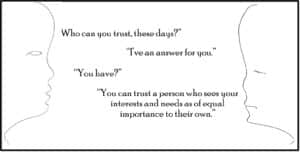Here’s something you need to know about morality:
It’s not a belief system, an ideology, or a religion.
It’s a tool.
An algorithm.
A sort of machine.
How do I justify this claim? I justify it on the basis of the necessary characteristics outlined in the first article in this series: What Morality Is.
These necessary characteristics are:
???? It’s universal
???? It’s rational
???? It requires sentience
???? It presupposes freedom
???? It needs a source of authority
???? It’s singular
???? It defines what’s right or wrong
Belief systems, ideologies or religions don’t quite match up to these criteria – and particularly fail on the first two: the requirements for universality and rationality. They also breach morality’s requirement for singularity. There are just so many ideologies and religions…
On the other hand, seeing morality as an algorithm or tool fits the bill far more neatly. There is no conceptual or logical reason why a cognitive tool shouldn’t tick each of these boxes. Why shouldn’t you have a tool which is universal, rational, requires sentience, presupposes freedom, requires a source of authority, is singular and defines what’s right or wrong?
Currency
Tools, algorithms and machines are objects that have a function, a purpose.
To a large extent, what they’re for is what they are.
Currency, for example, is a conceptual tool which we embody as pieces of paper, as coins or in bank accounts. It allows us to store or represent wealth and facilitate purchases, sales and other forms of exchange. If you simply looked at the paper, the coins or the binary signifiers in a bank account, but didn’t know what they were for, then you wouldn’t actually understand money.
Which brings us to the principle question of this article: What is morality for?

Gadgets and gizmos
Let’s begin with a process of elimination.
Some tools or machines or algorithms help us make things.
Could that be what morality is for?
Making stuff?
Well, not really.
I’m sure you’ll agree that churning out gizmos and gadgets, products or consumables isn’t really morality’s forté.
Rules
How about manufacturing rules? Well, that certainly seems like something morality does… but even if rule-production is a part of morality’s function, we’d still be asking, “What’s the purpose of the rules?”
To say, “Morality is for generating rules,” simply pushes the question down the road.
Let’s look for something better.
Adrenalin
Some tools or machines help us do things.
Does morality help us in that way?
Incidentally, perhaps.
But a lot of stuff helps us do things.
Hammers, spanners, electric saws.
Or adrenalin. Adrenalin is a sort of hormonal tool. It helps us react quickly, or win a race.
It’s true that morality helps us do things, like make decisions or form an opinion of a person, but that’s not its defining purpose. Lots of things help us do things. Being useful is a partial definition of any tool.
So, helping us do things might be something morality does, but it’s not a sufficient account of what morality is for.

A diversion
How about entertainment?
There are numerous devices or artefacts which are aimed at entertaining or diverting us.
Televisions.
Rubik cubes.
Jigsaws.
Plays, songs, dance.
But morality doesn’t feel like that sort of thing. In fact, it’s rarely entertaining – and it’s far more important than a diversion.
It would be a long stretch to suggest entertainment or diversion could be the primary purpose of morality. Is it even worth going there?
Control
How about something more complex?
Some tools are cognitive or psychological, made up of concepts or techniques, and this clearly applies to morality.
Propaganda, for example, is a cognitive tool and its purpose is to manipulate us.
So, could the purpose of morality be the same?
Is it – as it has often seemed in the past – a tool for manipulation or control? Is it a subtly coercive means of reinforcing hierarchy?
Well, that’s problematic.
You see, for morality to work, it’s essential you are free. That’s one of the necessary characteristics of morality we discussed in the previous article.
If you aren’t free, morality doesn’t apply. Nothing is your fault. You’re just an automaton or a slave, obeying someone’s else’s rules or commands.
In fact, morality and control are inversely proportional.
The more control is exerted over you, the less responsibility you have for what you do.

So, given morality’s requirement for freedom, to suggest morality is about control is conceptually contradictory.
A destabilising force
How about stability?
Is morality’s function to keep communities or societies stable?
Intuitively, this seems a good answer – but there’s a problem here, too.
What if the stability experienced in a society embeds hierarchy, privilege, exploitation or control?
How about a stable slave-owning society?
Morality’s intrinsic requirement for individual freedom would necessarily destabilise such a society.
So morality can’t be about stability or control – and we’re still looking for an answer as to what it’s actually for.
Dodging the question
Guidance?
Does that fit the bill?
We touched on this earlier, when we spoke about rules.
Guidance is a good answer, and offering guidance – defining what we ought or ought not do – is a central characteristic of morality. It’s one of morality’s seven necessary characteristics as outlined in the previous article in this series.
But ‘Morality is for guidance’ is not quite sufficient as an answer.
Quite a few things offer guidance.
User manuals, for example.
Teachers and gurus.
Or Google Maps.
We’re still left asking, “To what end? What’s the guidance for?”
An object’s purpose is one of Aristotle’s four causes. There are many things you can’t really define or categorise until you know what they’re for – or, as Aristotle terms it, unless you understand their final cause.
If we answer the question, “What’s morality for?” with “To offer guidance,” all we’ve done is dodge the question.
Bringing us together
How about cohesion? The cohesion of communities, of nations? Could that be what morality’s for?
It’s a great suggestion, and brings us close to an answer.
After all, a rational, shared morality seems ideally suited to helping societies cohere.
To act effectively as a society, an economy, a business or a movement, we need to have a shared code of conduct, we need to be able to take people on their word, to rely on them, even if we’ve never met, even if they live on the opposite side of the world.
To work together, to achieve anything as a group or a civilisation, we need to be able to trust each other – and the best guarantor of trust is morality.

After all, a moral person has integrity, doesn’t lie, keeps their word, respects your interests.
You can trust a moral person.
And, if you are moral, other people can trust you too.
Glue
So morality helps us trust one another, helps us cohere, offers guidance which, if shared, assists us in working together toward mutual goals.
It’s like a glue that binds a society together.
It’s like an oil that helps a society run.
But we still have a problem.
The internal cohesion of a specific group or a community, of a nation or even a civilisation, conflicts with a necessary characteristic of morality: the characteristic of universality.
The universal character of morality transcends borders: the borders between me and you; the borders between my family and yours; the borders between nations; even the borders between civilisations.
Civilisation
Take any two civilisations. Morality applies to both of them. Whichever civilisation you’re in, the killing of innocents who don’t wish to die is wrong. Slavery is wrong anywhere, at any time.
So if morality is about cohesion, then it’s not just about the internal cohesion of a group or a nation or even a civilisation.
It’s about the cohesion of all groups, all nations, all civilisations.
It’s not just about unifying a few of us. It’s about unifying all of us: all autonomous, sentient, self-aware beings.
A new Lord of the Rings
So there you have my answer to the question of what morality is for. Morality’s inherent characteristics, its universality, its recognition of individual freedom, its offering of guidance and a basis for trust, all drive us toward this conclusion: that morality is a cognitive tool for generating harmony between rational, autonomous, sentient beings.
It is a unification machine with the purpose and function of bringing us together, whether we’re part of a tribe, a village, a community, a nation, a species, a conclave of self-aware AIs or multiple sentient species.
This is its great power, its purpose and its utility.
To use The Lord Of The Rings as a metaphor, and to make Sauron’s purposes entirely good, morality is the one ring to find us all and through our free choice bind us.
Morality is a Universal Sentience Unification System. Unification into tribes, communities, nations, civilisations is what the tool of morality is for.
It is our greatest invention since language.
Greater than fire.
Greater than the wheel.
In my next article in this series, published on Dorset Eye tomorrow, I’ll look at the question of moral authority. What justifies the moral imperative? What makes our moral judgements so compelling?
Luke Andreski
Luke Andreski is a founding member of the @EthicalRenewal and Ethical Intelligence collectives. His books include Intelligent Ethics (2019), Ethical Intelligence (2019), Short Conversations: During The Plague (2020) and Short Conversations: During the Storm (2021).

Intelligent Ethics is available here.
You can connect with Luke on LinkedIn, https://uk.linkedin.com/in/luke-andreski-ethics, or via @EthicalRenewal on Twitter https://twitter.com/EthicalRenewal
With thanks to Dr.Hausderivative for the fabulous whale’s fin image CC BY-SA 3.0 https://creativecommons.org/licenses/by-sa/3.0, via Wikimedia Commons.
Join us in helping to bring reality and decency back by SUBSCRIBING to our Youtube channel: https://www.youtube.com/channel/UCQ1Ll1ylCg8U19AhNl-NoTg and SUPPORTING US where you can: Award Winning Independent Citizen Media Needs Your Help. PLEASE SUPPORT US FOR JUST £2 A MONTH https://dorseteye.com/donate/








You can find the preceding article in this series, ‘What Morality Is’, here: https://dorseteye.com/what-morality-is/
Morality’s source of authority must be something we all have in common – something which is objective not subjective, factual not mythical, substantive not ethereal.
So what source of authority might satisfy these criteria?
I discuss this crucial question in the next article in this series:
https://dorseteye.com/moral-authority/